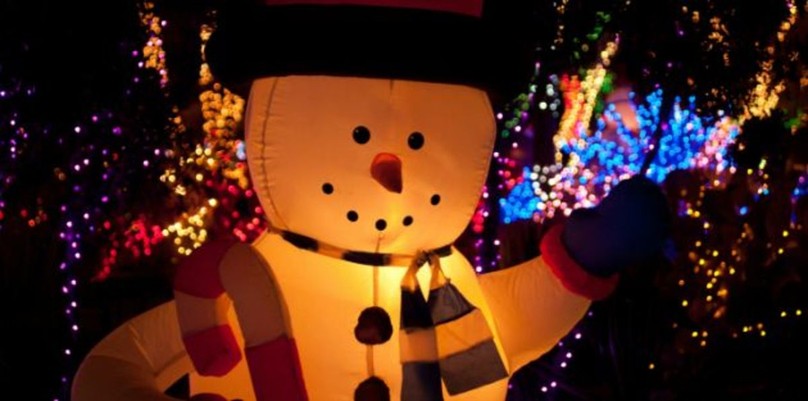
I live in a neighborhood that really gets into decorating. Inflatables were everywhere in our neighborhood last Christmas. And by inflatables, I do not mean small ones. No. There were penguins in a life-sized sleigh, a six-foot Frosty, an eight-foot Snoopy, and a traveling twelve-foot Santa who graced several lawns...that was curious.
Our kids loved riding around and seeing the characters, huge outdoor ornaments on trees (we never had those growing up), and lights. But on one drive by, I was disappointed to see an inflatable Santa in an outhouse. He would move to peek his head out as the sign above him read, "Occupied."
I get the joke, three shades more crass than the beloved movie classic Christmas Vacation. But we can choose when to turn a movie on and off in our house. When something's on a neighborhood lawn, it's a different story. Every child who saw the Santa was mesmerized, and even if they didn't fully understand the joke, they were still learning.
That inflatable struck me as representing everything wrong with Christmas celebrations in our culture. Jesus has been replaced by Santa, and even that generous elf isn't safe anymore. It makes me wonder: Are we at risk of losing the sacredness of Christmas?
Every year, I grow increasingly tentative to greet people with the merriment of the season and proclaim, "Merry Christmas!" As a pastor, the only place I feel invited to say so is either at church or among Christian friends. Many corporate workplaces no longer boast Christmas decorations for fear of offending, and greeting cards typically tout a generic holiday message, if they're sent at all.
There is joy in our hearts this season as Christians, and there is a reason for that joy. Not only do I want to proclaim it, but we need to proclaim it. The world is still broken, people are still hurting, and there is a precious baby who still saves. So the question becomes: How can we faithfully yet respectfully respond to this calling? The answer begins with the decisions we make at home.
For starters, our culture makes Santa the focus of Christmas for children, and I want to reverse that trend. Santa only brings small stocking stuffers in our house - the bigger and more "meaningful" gifts come from family. After all, we don't want him to be too beloved! But my husband and I also educate about the true meaning of the holiday. We attend a Christmas Eve service together as a family and decorate with nativities.
Our sons attend a Christian preschool. I was delighted to see our older son in his first school play last year, which retold the Christmas story. By the end of several weeks of practicing, he knew all of the parts and could skillfully retell it. I want my children to internalize that story and know the real hope of the season.
One way I’ve learned to help children understand Christmas is as a birthday party for Jesus. Every child loves birthdays! As we appreciate the innocence of the Christ child as adults, they can relate to Christ as one of their own. He is approachable, a "friend," and yet also their God who offers so much more.
In addition to focusing on Christ instead of Santa, we’re examining our family traditions. My husband and I are choosing what we want to continue and discontinue from our childhoods. We're also planning new traditions to start. It’s easy to get caught up in the holiday flurry and lose that intentionality. Yet as parents, we have influence on just what Christmas means to our children now and will mean to them after they’ve left home.
Scrooge's transformation is so dramatic in A Christmas Carol because he moves from a selfish understanding to a generous one. It is through a giving spirit that we can best witness to others at Christmas. After all, Christmas isn't about the decorations or the greeting cards anyway. It's about the Light of the world coming to earth and our invitation to shine that Light until he comes again.
Further, celebrating the holiday is more than simply proclaiming "Merry Christmas” with our words. It's about the state of our hearts and the deeds of our hands. It's about loving others because God loved us enough to send and sacrifice his only son. The most important family traditions aren't only about remembering that promise, but also living it. That’s why my family is planning to do at least one missional activity together this Christmas.
The best way our children can learn about Christmas is to see it modeled. Keeping Christ at the heart of Christmas and nurturing a giving spirit are essential to reclaiming it. Culture and the holiday flurry don’t have to dictate the terms; we can honor Christ first instead. When we do, we'll experience the season's magic firsthand. Its magic doesn't come down a chimney and isn't found on any lawn - it's renewed and reborn in our very hearts.
Question:
Do you have a meaningful Christmas tradition that you’d like to share? What do you do to keep Christ at the heart of Christmas or give back to others as a family? Please comment below - I'd love to hear!









